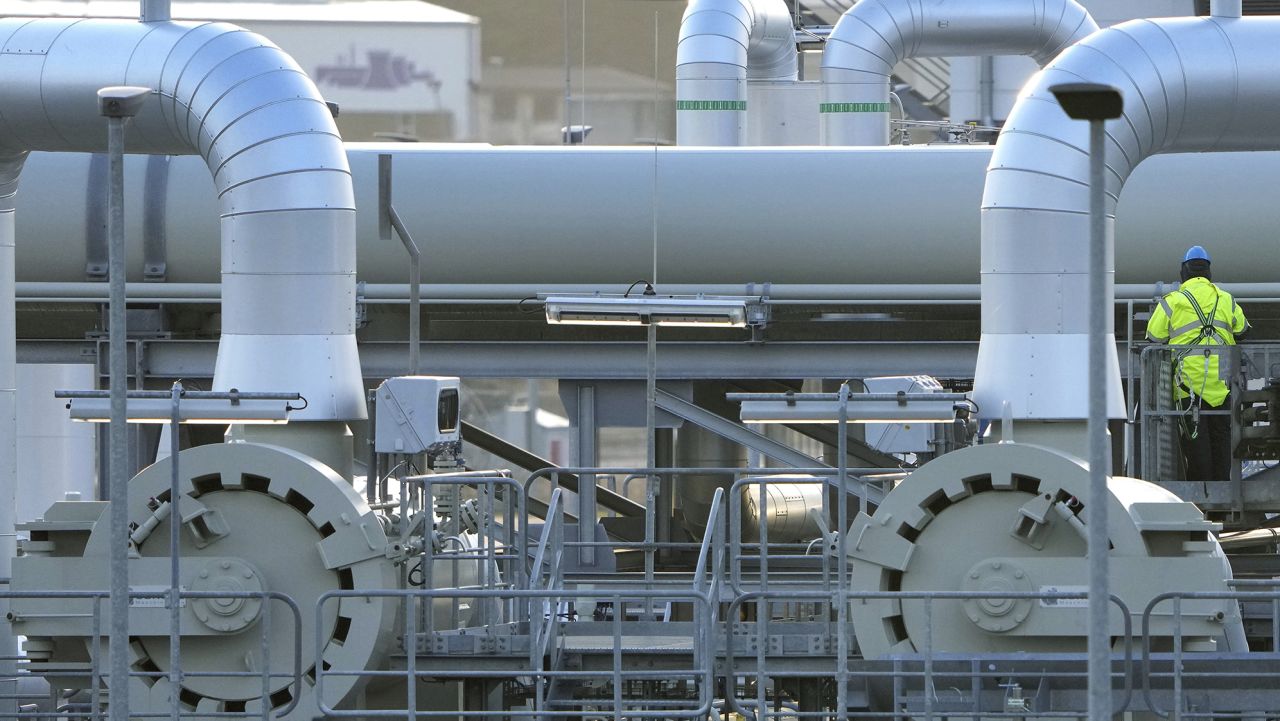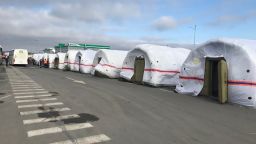Western leaders announced a tranche of sanctions against Moscow after Russian President Vladimir Putin ordered troops into separatist-held parts of eastern Ukraine, a move that the United States called the start of Russia’s invasion of the country.
It comes as diplomatic efforts to avoid an escalation appear to have stalled after US Secretary of State Antony Blinken announced he had canceled a planned meeting with Russian Foreign Minister Sergey Lavrov in Geneva this week.
President Joe Biden said on Tuesday the US will sanction Russia’s financial institutions and oligarchs. The United Kingdom, European Union, Canada, Australia and Japan also announced fresh sanctions on Russia.
Earlier in the day, Germany said it halted certifying a $11 billion 750-mile pipeline that connects Russia directly to Germany. The Nord Stream 2 project was completed in September but has not yet received the final green light from German regulators.
Russia sharply escalated its military campaign against Ukraine on Monday night, recognizing two pro-Russian breakaway regions in eastern Ukraine before ordering troops into the territories.
Moscow has long maintained that it has no soldiers on the ground in eastern Ukraine.
However NATO chief Jens Stoltenberg said Tuesday that Russia has had troops inside the regions – known as the Donetsk People’s Republic (DPR) and the Luhansk People’s Republic (LPR) – since they were self-declared in 2014.
Stoltenberg slammed the troop movement as a “further invasion of a country that has already been invaded.”
Putin has not yet set a timeline for troops to move into the separatist regions, but in a speech Tuesday afternoon, Biden described events now underway in Ukraine as “the beginning of a Russian invasion.”
“This is a flagrant violation of international law and demands a firm response from the international community,” Biden said.
In a national address on Tuesday, Ukrainian President Volodymyr Zelensky said he was still pursuing diplomacy as a way out of the crisis. Reservists would be called up for military training, he said, but there will be no general mobilization of armed forces.
“We desire peace and calm, but if we are quiet today then tomorrow we will disappear,” Zelensky said.
The Ukrainian President also referred to Putin’s announcement that the Minsk Agreements – designed to end the fighting in eastern Ukraine – no longer applied, saying that Ukraine remained committed to seeking its sovereignty and integrity.
Putin, who has steadily amassed some 150,000 military personnel near Ukraine’s borders, appeared to cast doubt on the sovereignty of Russia’s neighbor in an angry speech on Monday.
“Ukraine has never had traditions of its own statehood,” he said, seemingly calling into question the country’s right to exist as an independent nation, and referring to its eastern region as “ancient Russian lands.”
On Tuesday, the EU sanctioned 351 Russian lawmakers who voted to recognize the breakaway regions and the UK announced sanctions against five Russian banks and three Russian oligarchs.
Other nations, including Australia and Japan, vowed to work in lockstep with the international community on sanctions.
The Baltic states – long fearful of Russian encirclement – watched Monday’s events with alarm.
“Putin just put (Franz) Kafka & (George) Orwell to shame: No limits to dictator’s imagination, no lows too low, no lies too blatant, no red lines too red to cross,” the Prime Minister of Lithuania, Ingrida Šimonytė, wrote on Twitter.
“What we witnessed tonight might seem surreal for democratic world. But the way we respond will define us for the generations to come,” she said.
International condemnation
Amid the clamor of countries condemning Russia’s planned incursion, some nations steered clear of criticizing Moscow.
During an emergency meeting of the UN Security Council Monday evening, India called for “restraint on all sides,” stopping short of criticizing Russia.
China’s envoy to the United Nations on Monday called for “all parties” to exercise restraint and avoid “fueling tensions” in Ukraine, but stopped short of condemning the Kremlin’s recognition of independence for the DPR and LPR. China’s Foreign Ministry evaded more than a dozen questions regarding Ukraine at a briefing on Tuesday.
Kenya’s envoy to the United Nations, however, delivered a blistering statement on Putin’s imperial ambitions in Ukraine. “We believe that all states formed from empires that have collapsed or retreated have many peoples in them yearning for integration with peoples in neighboring states. This is normal and understandable. After all, who does not want to be joined to their brethren and to make common purpose with them?” Martin Kimani said Monday, according to a readout of his remarks.
“However, Kenya rejects such a yearning from being pursued by force. We must complete our recovery from the embers of dead empires in a way that does not plunge us back into new forms of dominion and oppression,” he said, adding that Kenya rejected “expansion on any basis, including racial, ethnic, religious or cultural factors.”
For almost eight years, the breakaway regions of Donetsk and Luhansk have seen a low-intensity conflict between Russian-backed separatists and Ukrainian forces, which has left more than 14,000 people dead.
Moscow has also distributed hundreds of thousands of Russian passports to people in Donbas in recent years. Western officials and observers have accused Putin of attempting to establish facts on the ground by naturalizing Ukrainians as Russian citizens.
Kyiv and the West maintain that the region is part of Ukrainian territory, although the Ukrainian government asserts the two regions have been, in effect, Russian-occupied since 2014, when the conflict in eastern Ukraine began.
Correction: This story has been updated to correct the date Nord Stream 2 was completed.
CNN’s Anna Chernova, Vasco Cotovio, Joseph Ataman, Pierre Bairin, Ivana Kottasová, and Helen Regan contributed to this report.



















